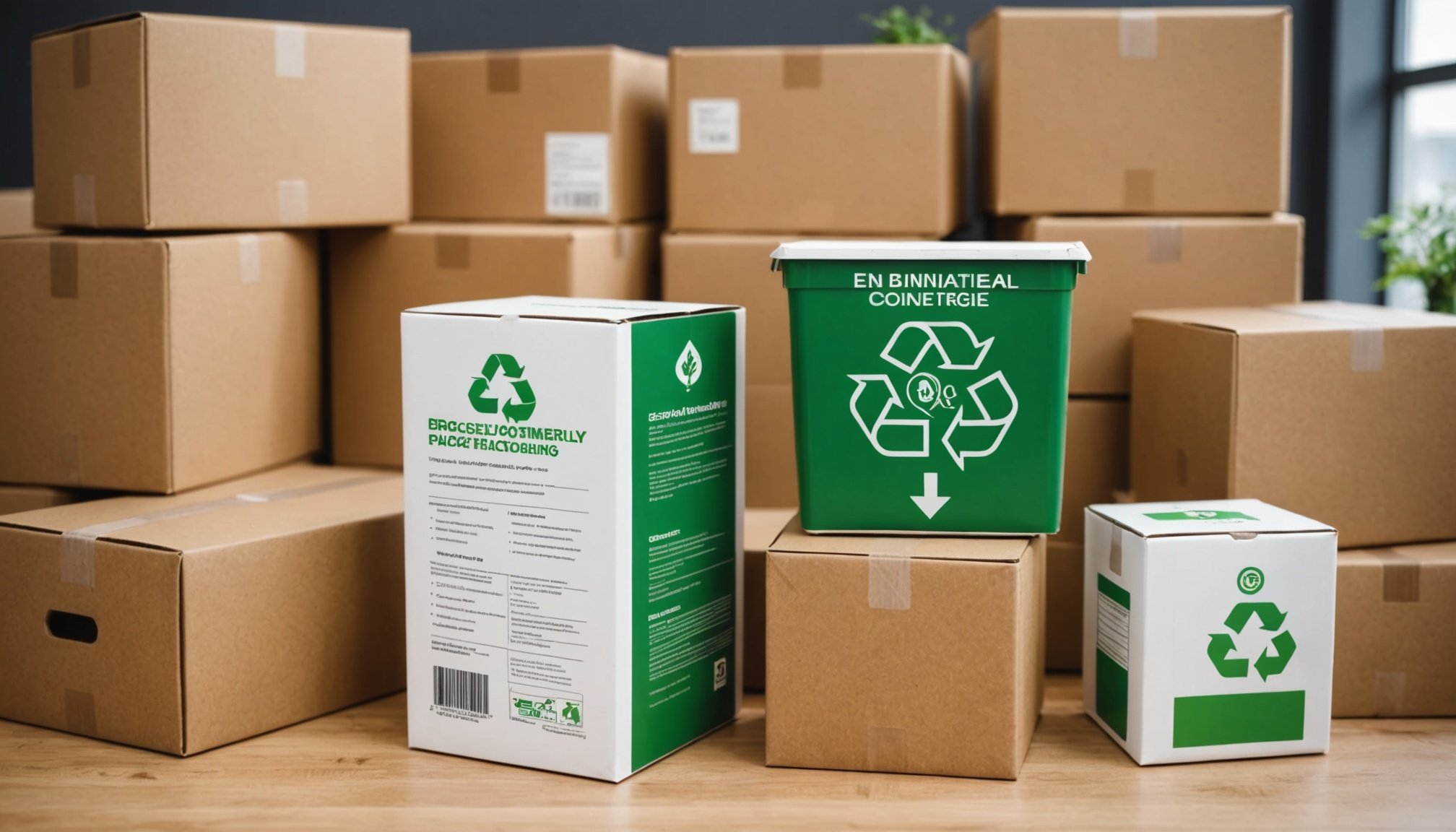Overview of Environmental Regulations in the UK
The UK is at the forefront of implementing environmental regulations aimed at reducing the ecological footprint of packaging. Currently, UK packaging laws target non-recyclable materials, promoting increased use of sustainable alternatives. Compliance with these regulations ensures that businesses contribute to a cleaner environment, reducing waste through innovative packaging solutions.
Key compliance requirements include adherence to recycled content mandates, proper labelling for disposal, and ensuring all packaging materials are either recyclable or biodegradable. For eco-friendly businesses, it’s vital to integrate these into their operational strategy to avoid penalties. As regulations are frequently updated, maintaining vigilance on changes can shield companies from legal repercussions and bolster their green credentials.
This might interest you : Unlocking financial success: key strategies for tech startups in the uk – an in-depth guide
Understanding these essentials equips businesses to not only meet legal obligations but also to enhance their reputation as environmentally conscious entities. Keeping abreast of legislative amendments, utilising governmental guidelines, and participating in industry workshops are effective practices for staying informed. Compliance also demonstrates a commitment to sustainable practices, which resonates well with today’s environmentally-aware consumers. Thus, it’s imperative for businesses involved in packaging to pivot towards eco-friendly practices proactively.
Sustainable Materials for Eco-Friendly Packaging
The use of sustainable materials in packaging is essential for businesses aiming to minimise their environmental impact. Opting for biodegradable options such as cornstarch, hemp, and seaweed, offers significant ecological benefits. These materials decompose more efficiently than traditional plastics, thus reducing the overall waste footprint. Moreover, incorporating recycled content like post-consumer recycled plastics or paper not only conserves resources but also aligns with UK regulatory mandates promoting recyclable materials.
Also to see : Kickstart your eco-conscious event planning business in the uk: a comprehensive step-by-step blueprint
Using biodegradable and compostable packaging solutions is advantageous because they are made from natural substances that break down easily in the environment, leaving no harmful residues. For businesses, adopting such materials can also enhance brand image, showcasing a commitment to sustainable practices.
Incorporating recycled content helps meet industry standards and can be achieved by using recycled paper, glass, or certain metals. These are not only cost-effective but also reduce the dependency on virgin resources. Implementing these sustainable options requires an understanding of their properties and advantages, allowing businesses to choose the most relevant and effective materials for their packaging needs. By doing so, they contribute positively to the environment while maintaining compliance with UK packaging laws.
Innovative Packaging Design for Compliance
The role of packaging design innovation is crucial in crafting solutions that are both environmentally sound and compliant with regulations. Principles of an eco-friendly design revolve around minimising environmental impact through resource-efficient choices while maintaining functional aesthetics. Such designs not only comply with but also advance the standard of sustainable packaging solutions.
Functionality and aesthetics work hand-in-hand in sustainable packaging. Effective designs ensure that packages are easy to use while being mindful of their environmental footprint. For example, reducing material use in packaging not only cuts costs but also lightens the load on waste systems. Designs that feature modular components can be easily separated for recycling, further enhancing their sustainability.
Innovation can lead to impressive examples of packaging designs that meet tough regulations. Consider solutions where recycled cardboard is used to create visually appealing yet biodegradable packaging, capturing both the look and responsibility necessary for today’s market. Embracing packaging design innovation means businesses are better positioned to meet current governmental and consumer demands while setting a higher bar for the industry.
Effective Waste Management Practices
Waste management is crucial for businesses aiming to meet environmental regulations and reduce their ecological footprint. A comprehensive approach to waste management involves several strategies, each designed to tackle different aspects of the packaging lifecycle.
Implementing an effective recycling program is a primary step. Such programs ensure that materials, especially those compliant with UK packaging laws, are systematically collected and processed. For businesses, this might involve setting up dedicated bins for recyclables and training staff on proper waste segregation techniques.
Incorporating waste reduction strategies can further enhance compliance efforts. Techniques such as lightweighting, where packaging design minimises material usage without compromising product integrity, significantly lower waste generation. Furthermore, adopting refillable and reusable packaging systems can dramatically decrease the amount of waste produced.
In daily operations, best practices include regular waste audits to identify reduction opportunities and the use of technology to track progress. Collaboration with suppliers for eco-friendly packaging materials and consumer education campaigns also play vital roles. By embedding these practices, businesses not only ensure regulatory adherence but also demonstrate a strong commitment to sustainability, appealing to eco-conscious consumers.
Case Studies of Successful Eco-Friendly Packaging Businesses
Understanding real-world examples of successful businesses can provide invaluable insights for those aiming to excel in the eco-friendly packaging sector. Several UK companies have set benchmarks by fully complying with environmental regulations and UK packaging laws, earning both commercial success and customer loyalty. These businesses not only meet compliance requirements but often exceed them by embracing sustainable innovation.
Case studies of such exemplary businesses highlight essential strategies: aligning operations with compliance standards, investing in recyclable and biodegradable materials, and maintaining transparency with consumers. Among the leaders are businesses that have transformed their packaging processes, reducing waste and increasing efficiency.
The direct impact of compliance on brand reputation is profound. Companies that stay ahead of regulatory changes and prioritize sustainability often enjoy heightened customer loyalty and brand trust. These businesses provide a roadmap by integrating rigorous compliance frameworks into their business models, resulting in a win-win scenario for the environment and their market position.
By examining these industry examples, businesses can glean lessons in resilience and agility, enabling them to navigate regulatory landscapes successfully and contribute positively to environmental preservation.
Challenges and Solutions in Compliance
Navigating the path of compliance in the eco-friendly packaging industry presents unique challenges. Businesses often face regulatory hurdles stemming from frequently changing legislation and the complexity of integrating eco-friendly practices seamlessly into existing operations. Understanding these challenges is vital for devising effective solutions.
Common compliance challenges include the cost of transitioning to more sustainable materials and the technology required for innovation in packaging design. These financial and logistical barriers can hinder companies, particularly smaller ones, from making necessary changes.
To overcome these hurdles, practical solutions involve continuous industry education and the adoption of advanced materials and technologies. Collaborating with fellow businesses and industry experts can also provide insights and reduce costs. Participation in workshops and seminars encourages knowledge sharing and supports the implementation of sustainable practices effectively.
The importance of collaboration across the industry cannot be overstated. When stakeholders work collectively to better understand and address compliance challenges, it not only fosters innovation but also eases the burden of adherence. Together, these collaborative efforts can lead to more robust, environmentally-responsible solutions, paving the way for effective compliance in eco-friendly packaging.
Resources and Tools for Compliance
Navigating the complex landscape of environmental regulations requires comprehensive compliance resources and effective tools. For eco-friendly packaging businesses, access to these resources can be the difference between success and bureaucratic hurdles.
A wealth of tools is available to support firms in adherence to UK packaging laws. These include software for tracking waste reduction and recycling programs, ensuring that every facet of waste management aligns with compliance requirements. Other tools help scrutinise materials for their environmental impact, assisting businesses in making informed, sustainable choices.
Industry support plays a pivotal role, with organizations offering guidance through workshops and seminars. These venues provide invaluable opportunities to learn from experts and peers alike about innovative strategies for maintaining compliance.
Utilising these tools effectively not only streamlines the path to meeting legal obligations but also bolsters a company’s green credentials. With resources and support readily available, businesses can more confidently face the challenges of implementing sustainable practices.
For those at the forefront of eco-friendly packaging, staying updated with regulatory changes and leveraging compliant resources is critical, shaping a future where sustainability and success seamlessly coexist.






